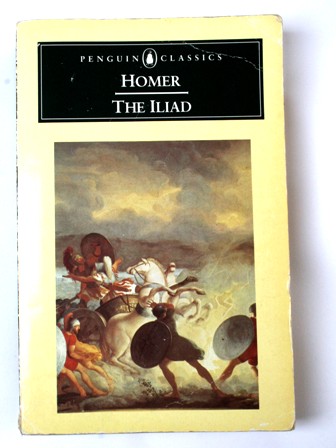
No 8: The Iliad by Homer
What’s it about?
The Iliad focuses on an episode of the Trojan War and tells the story of the Greek hero Achilles, his withdrawal from battle and eventual return to kill his Trojan counterpart Hector. For an undisputed classic of world literature the plot is fairly simple but does suggest the epic nature of the tale. King Agamemnon, overlord of the Greeks, and his brother, Menelaus of Sparta, have brought together the princes of Greece to join him in battle against King Priam of Troy. Paris, one of Priam’s sons, has previously run off with Menelaus’ wife, Helen (then of Argos, later Troy). Nine years into the war, during which the Greeks have been camped near Troy to little great effect, Agamemnon and Achilles, the most dashing, vigorous and tempestuous of all the Greek princes, fall out over a girl – more accurately two girls – which prompts Achilles to go into a huge sulk and withdraw his forces from the battlefield. In his absence the campaign turns against the Greeks and Achilles eventually sends his closest friend, Patroclus, to rescue the situation. Patroclus gloriously succeeds but is killed under the walls of Troy by Hector, the commander of the Trojan forces. In a fury of grief and guilt Achilles re-enters the fray and drives the Trojans back into their city, killing Hector in the process and taking his revenge on Hector’s body. With divine help Priam recovers his son’s remains from the Greek camp and the Iliad closes with the funeral of Hector and an uneasy truce.
What’s it got to do with leisure?
With the calendar now racing to turn its pages towards 2012, it is the account of the games that follow the funeral of Patroclus that captures the leisure professional’s attention here. A natural corollary of the funerary rites, these games offer a wealth of prizes, impressive levels of competitive spirit, divine intervention and no little cheating, not to mention blood-soaked sacrifices and an unreconstructed attitude to women. The chariot race is the opening event. Achilles, who is organising the games, declines to take part because, as he modestly notes, he is in mourning but would have won anyway. King Nestor coaches his son, Antilochus, on driving techniques and tactics but to no avail. Diomedes wins with Antilochus second, prompting accusations of cheating and general rancour. After the chariot race comes boxing, wrestling, a foot race (won by Odysseus with the help of the goddess Athene), armed battle (a sort of two-person, horseless jousting), discus-throwing, archery (with doves as targets) and javelin-throwing. Agamemnon is awarded this final prize without recourse to actually throwing anything in recognition of his acknowledged javelin prowess.
Why should I read it?
This is generally regarded as Homer’s major work in comparison with the Odyssey, the travelogue of Odysseus’s journey home after the Trojan War. It is also considered to be the greatest achievement in Greek literature, a literary field that is full of strong contenders. In the context of a mythical past, the Iliad is a rattling good story of gods and men with all too obvious frailties and short-comings. E V Rieu, the translator of the Penguin 1950 edition, notes that Homer demonstrates a strong sense of modernity; not ‘modernity’ in the sense of the twentieth-century but in the sense of ‘contemporary’ and ‘true to Homer’. As Rieu puts it: “He did not summon them from the legendary past: he created them out of his own experience of life.” Homer’s characters are not taken from the heroic age but are recognisably human to his original audience and to us reading several millennia later. They demonstrate the joy and tragedy of the human condition, along with all the joy and anger, jealousy and love, lust and vengeance which that entails. Homer demonstrates a reverence for the gods but shows them as a family, with all the attendant tensions, arguments and comedic bickering. There is unalloyed brutality (Homer acknowledges that Achilles decision to add a dozen Trojan sons to the dogs and horses sacrificed at Patroclus’s funeral is “an evil thing”) and, to our modern tastes, some unedifying gender politics (women as prizes being perhaps the most obvious) but Homer’s tale of Achilles in the shadow of Troy is as engaging and captivating today as when it was first written down.
the leisure manager’s library
An occasional series offering a guide to leisure-related literature
